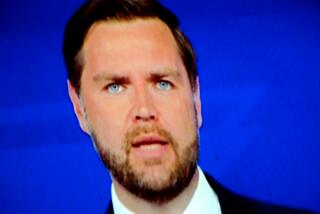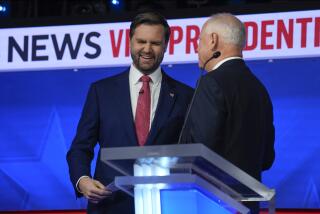Clinton and Trump launch their vice presidential sweepstakes. Who will they choose? No one knows, but everybody wants to guess the ticket
The selection of a vice presidential running mate is one of those political rituals so firmly fixed you can practically set a watch by it.
The presumptive presidential nominees quietly vet assorted prospects. Observers loudly — if blindly — speculate on who’s in the running. Names are floated, then shot down.
The pundits solemnly remind us this will be The First Executive Decision the White House hopefuls make after emerging from the muck of the primaries, offering a glimpse inside their heads if not their political souls.
Democrat Hillary Clinton and Republican Donald Trump are both now deeply immersed in the process, having narrowed their prospects to roughly half a dozen finalists, though few know the actual number, much less the names of those under serious consideration. More on that in a moment.
Election 2016 | Live coverage on Trail Guide | Track the delegate race | Sign up for the newsletter
Meanwhile...
What does the Constitution say about qualifying for the vice presidency?
Article 2 states that the vice president must be a natural-born U.S. citizen, at least 35 years old and an inhabitant of the United States for at least 14 years at the time of his or her swearing in. That’s it.
Well, that certainly allows for casting a wide net!
Yes, in theory. But in reality, the choice comes down to a series of political calculations — chief among them, who can help a candidate win the White House in November — as well as personal considerations, not least whether two people sharing a ticket can get along. It’s sort of like a marriage with no chance of dissolution for at least four years.
What factors go into the decision?
Typically, candidates seek some kind of balance: ideological, demographic, geographic. In 2008, Barack Obama, a national newcomer, chose the archetypal Washington insider, Joe Biden. In 1980, Ronald Reagan chose George H.W. Bush, who was politically more moderate and made up for the ex-California governor’s lack of foreign policy experience.
Who are some of those being talked about this time?
Naming them is really a pointless exercise. There’s a good rule of thumb when it comes to the vice presidential selection process: Those who know don’t talk. And those who talk probably don’t know.
C’mon. Live a little!
OK, fine. Those rumored to be on Clinton’s short list include Rep. Xavier Becerra of Los Angeles, Housing and Urban Development Secretary Julian Castro, Labor Secretary Thomas E. Perez and Sens. Sherrod Brown of Ohio, Tim Kaine of Virginia and Elizabeth Warren of Massachusetts.
Wait, what about Vermont Sen. Bernie Sanders?
There’s no love lost between Clinton and Sanders after their bruising fight for the Democratic nomination. Sanders didn’t expect to be seriously considered for the No. 2 slot, and Clinton has apparently obliged him.
Is there a clear-cut favorite?
That’s impossible to say. Each of the prospects offers benefits and potential drawbacks. Becerra, Castro and Perez would be history-making candidates, with strong appeal to Latino voters. But it’s unclear they would pass the prospective commander-in-chief test. Warren might convince Sanders diehards to back Clinton, but she and the presumptive nominee haven’t had the warmest personal relationship. Brown could help in a key battleground state, but if elected would leave a Republican, Ohio Gov. John Kasich, to name his replacement.
That leaves Tim Kaine.
Who might be the safest and most conventional pick, and thus the least exciting.
Whom is Donald Trump considering?
He’s in a different situation than Clinton. Usually there is no shortage of prospects eager to run for vice president, however much they hide their ambitions. (Which is part of the application process, humility being the better part of virtue when you’re trying out for country’s highest-profile No. 2 job.) But in Trump’s case, a combination of his combustible personality and the steep odds he faces in November have caused many leading prospects — such as Florida Sen. Marco Rubio and Govs. Scott Walker of Wisconsin and Kasich of Ohio — to remove themselves from consideration. On Wednesday, Rubio said he would seek reelection to the Senate in November after repeatedly saying he would not.
Whom does that leave?
Former House Speaker Newt Gingrich is openly auditioning for the job, as are former Sen. Scott Brown of Massachusetts and New Jersey Gov. Chris Christie. Others haven’t flat-out said “no,” which, in the fashion of a nod and wink, signals their interest. Those include Sen. Tom Cotton of Arkansas, Oklahoma Gov. Mary Fallin and former Arizona Gov. Jan Brewer. But there’s really no way of knowing what Trump might be thinking or who else is on his list.
Any clear favorite?
Again, no. All of those prospects have off-setting strengths and weaknesses.
What about the good of the country?
Well, it certainly does my heart good to hear that question! For all their many differences, Trump and Clinton both say they have the same No. 1 priority in choosing a running mate: Each wants someone who could immediately step into the presidency if need be.
Didn’t John Nance Garner, a Texan who served two terms as Franklin Roosevelt’s vice president, disparage the job as not being worth “a bucket of warm spit?”
He actually used a more pungent word.
Yes, but to his larger point?
The job has changed greatly since the days when a vice president was like a potted plant, to be watered and dusted every now and then but otherwise ignored. Every vice president since Walter Mondale, Jimmy Carter’s No. 2, has played a substantive role and often been a very important player in his respective administration.
When will Trump and Clinton make their selection known?
Trump says he will announce his pick Friday in Manhattan. Clinton will wait until after Trump reveals his choice before revealing her selection. Her timing is anyone’s guess, so feel free to speculate. Everybody else is.
Twitter: For more political news and analysis follow me @markzbarabak
ALSO
More to Read
Sign up for Essential California
The most important California stories and recommendations in your inbox every morning.
You may occasionally receive promotional content from the Los Angeles Times.











